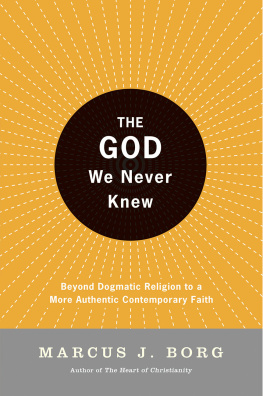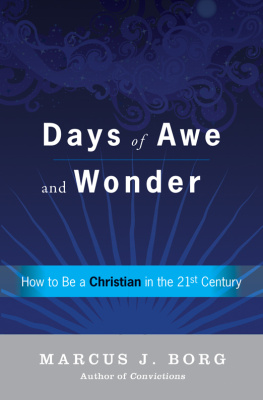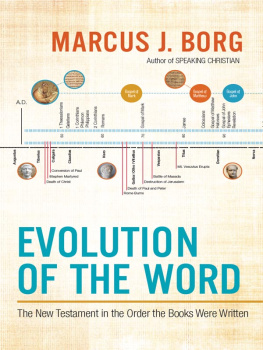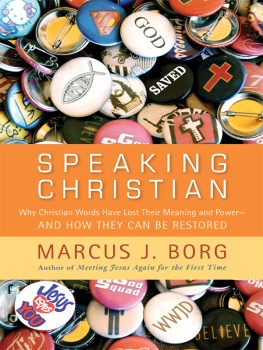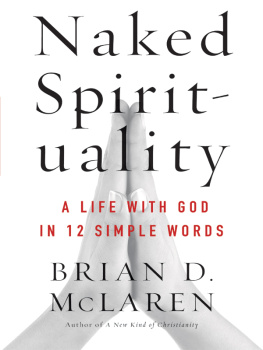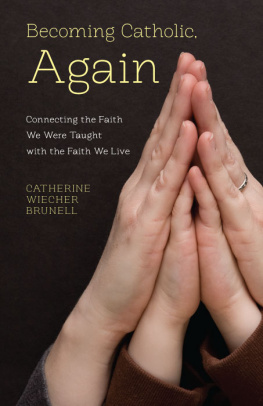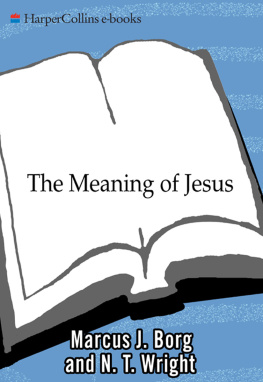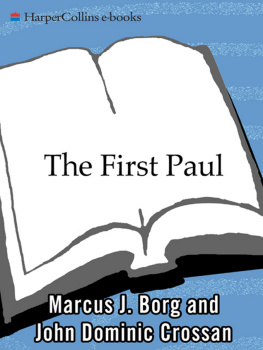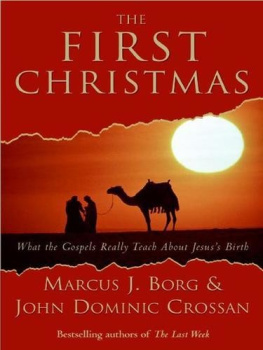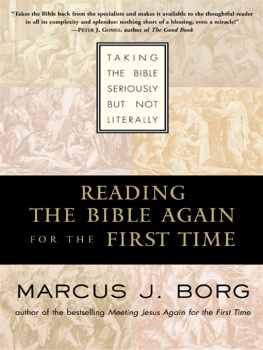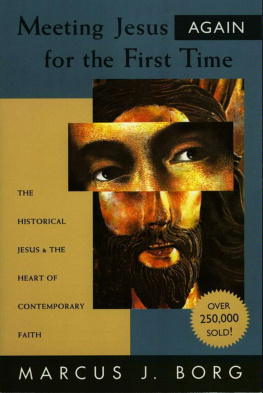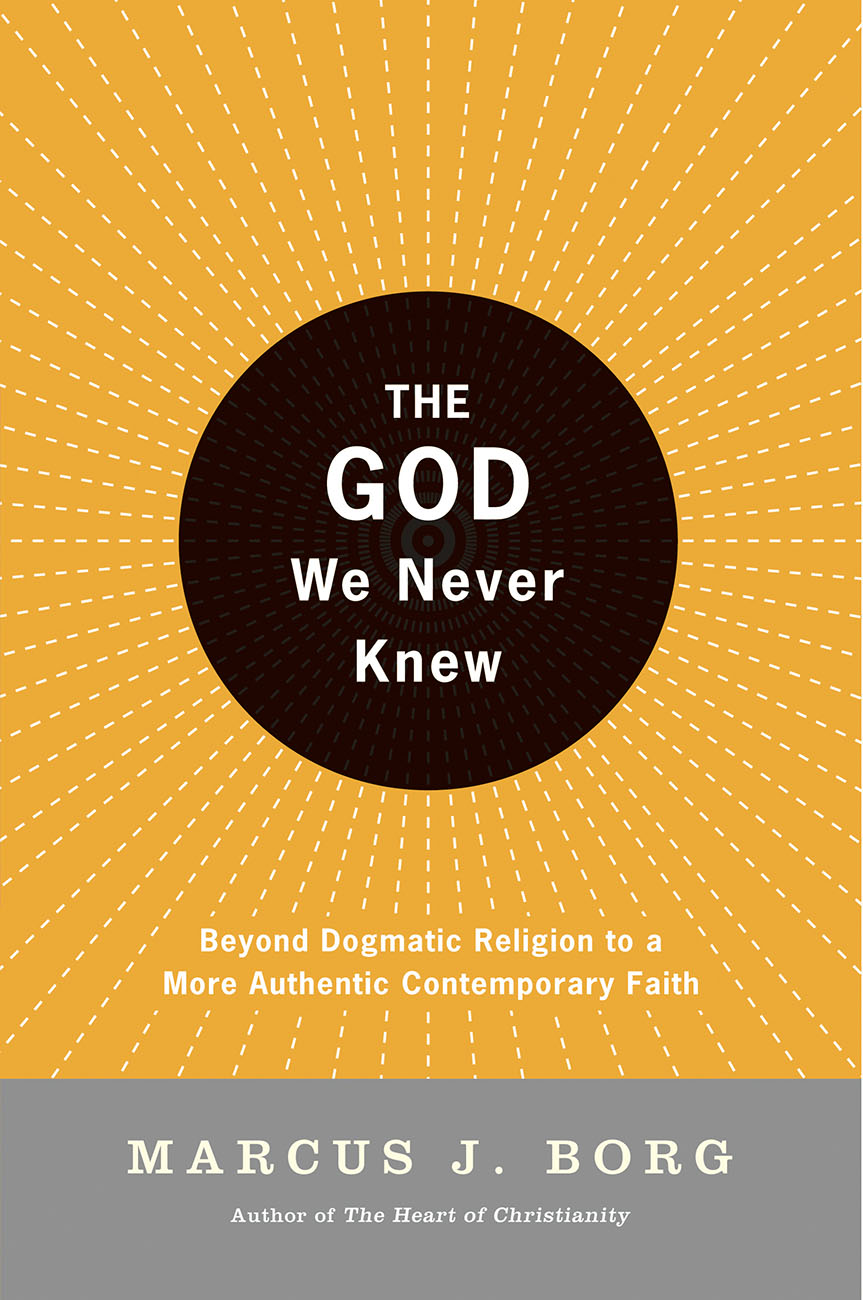Marcus J. Borg
Contents
Meeting God Again for the First Time
Thinking About God
Thinking About God: The God I Met the First Time
Thinking About God: Why Panentheism?
Imaging God
Imaging God: Why and How It Matters
Imaging God: Jesus and God
Living With God
Opening to God: The Heart of Spirituality
The Dream of God: A Politics of Compassion
Salvation: What on Earth Do We Mean?
W ith this book on God, I venture beyond my area of academic specialization. As a Jesus scholar, I have focused my research and writing on the historical study of Jesus and Christian origins, and the implications of such study for Christian theology and life.
But though I am a Jesus scholar and not a God scholar, the subject of God has been with me for a very long time, indeed from long before I was even aware of historical Jesus scholarship. I grew up with God. Ever since, the subject and question of Goddevotionally, intellectually, and experientiallyhas been central. I have been praising God, thinking about God, and yearning for God all of my life.
Thus, though I write about God as a nonspecialist, my interest is neither recent nor peripheral. As a professor of religious studies, I have taught courses about God for almost three decades. As a Jesus scholar, I have found it impossible to say very much about Jesus without also talking about God. Finally, my own Christian journey (from initial belief through doubt and unbelief to rediscovery and reformulation) has centered on the question of God.
This book thus comes out of my own journey, now more than five decades old, of living within the Christian tradition and seeking to make sense of it in a way that is faithful to both biblical and post-biblical traditions.
Because I am a nonspecialist, I do not see this book as a contribution to the scholarly discussion of God but as an accessible exposition of some quite general insights about the importance of how we think about God and image Godabout how our concepts and images of God affect not only our notion of the sacred but our understanding of the religious life itself. How we think about God matters.
My perspective is cross-cultural and Christian. On the one hand, I make use of insights drawn from the cross-cultural study of religionsespecially what they say about the sacred and experiences of the sacred. On the other hand, I focus especially on what Christianity (and the Bible) says about God. Most of my illustrations come from the Christian tradition, and the book centers on making sense of the Christian tradition by seeing it in a particular way as we move into the third millennium.
This dual perspective flows out of my vocational and existential commitments. The cross-cultural perspective comes from teaching religious studies in the pluralistic and quite secularized settings of a nondenominational private college and a public state university. In such settings, a cross-cultural approach is both natural and appropriate. Such an approach does not privilege any particular religious tradition, and does not depend on religious belief or commitment.
By Christian perspective, I refer to my own religious commitment and orientation. I am a Christian of a nonliteralistic and nonexclusivistic kind. As an Episcopalian, I am involved in the life of the church, living out my relationship to the sacred in a community that uses the language, symbols, and practices of the Christian tradition.
My Christian perspective accounts for this books focus on the Christian tradition. It is what I know best. Moreover, most readers of this book are Christians, or on the margin of the church, or living in a culture shaped by Christianity. The book thus centers on the religious tradition with which most of us are best acquainted.
I see this book as an attempt to do Christian theology within the framework of religious pluralism and the cross-cultural study of religion. Given its Christian focus and audience, it is written primarily for Christians but also for anybody interested in listening in on a Christian conversation. The conversation is one that has been going on within myself, with other Christians in the present, and with Christian voices from the past. My own conviction, developed in this book, is that the Christian tradition, understood at a deeper level than what many of us learned, makes persuasive and compelling sense.
I want to acknowledge the particular occasions that contributed to the incubation of this book. Portions of it were delivered as the Collins Lectures at Trinity Episcopal Cathedral in Portland, Oregon, in March 1995, and I wish to thank Mary Beth Collins and the Collins Foundation for supporting these lectures. I wish also to thank the Pacific Center for Spiritual Formation and Francis Geddes for inviting me to treat the subject of God at Wellspring Renewal Center in Mendocino County, California, in the summer of 1995. In addition, I wish to thank Father Gordon McBride and GraceSt. Pauls Episcopal Church in Tucson, Arizona, for inviting me to do a lecture series on God in November of 1996.
I also wish to thank my graduate assistant, Mary Streufert, for her very able and helpful assistance with this project. She is soon to have her first baby and will then move on to a different institution for doctoral work. I will miss her.
MEETING GOD AGAIN FOR THE FIRST TIME
T his book about the God we never knew describes an understanding of Godor the sacred or Spirit, terms that I use synonymously and interchangeablythat is very ancient as well as particularly suited to our own time. It is grounded in experience, my own and the experience of others throughout the centuries, and integrated with the biblical and Christian tradition. Though quite unlike the understanding of God that I acquired growing up in the church, it is not new but is consistent with the theological tradition of Christianity.
I suppose the title of this book could be The God I Never Knew, for it is to a considerable extent my own story. In it, I describe a way of thinking about God and living with God that I never knew as a child and young person, despite the fact that I grew up as a Christian.
I did not see this way of thinking about God and the religious life until I was in my thirties. I do not know the full explanation of why it took me so long. I may be slow-witted. But a major reason is that the notion of God I received as a child stood in the way. Because of my Christian upbringing, I thought I knew what the word God meant: a supernatural being out there who created the world a long time ago and had occasionally intervened in the aeons since, especially in the events recorded in the Bible. God was not here but somewhere else. And someday, after death, we might be with God, provided that we had done or believed whatever was necessary to pass the final judgment.
My childhood notion of God, with refinements, persisted for about three decades. In childhood, I believed in this notion of God without difficulty; in my early teens, I began to have doubts about it; in my twenties, the doubts became disbelief; but through this whole process, the same notion of God persisted. It was what I believed and then disbelieved. Compared to that notion of God, the God I have come to know since is the God I never knew.

